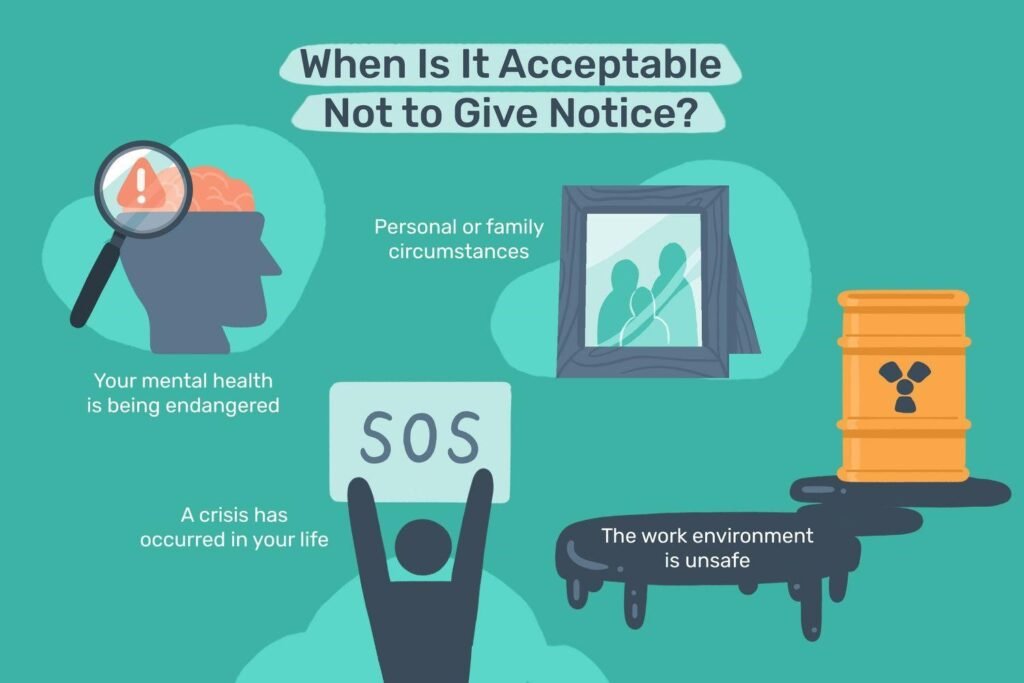
You might be wondering, “Could I face consequences if I leave my job abruptly without providing notice in the UK?”
Don’t worry! This comprehensive article delves into the legality of quitting a job without notice in the UK.
There are various reasons why people might choose to quit a job without fulfilling their notice period. However, it’s crucial to consider the potential consequences of leaving a job without fulfilling the terms and conditions, of which the notice period is one aspect.
In employment, notice periods are considered a crucial aspect of contractual agreements between employers and employees in the United Kingdom. An employee who wants to resign is expected to warn or notify the employer. This warning is called a notice period which should be clearly stated in your resignation letter to the UK. The notice period allows the employer to search for a suitable replacement and allows the employee to finish whatever needs to be done before leaving the company.
Can You Quit Without Notice Period in UK?
No, It is not illegal to quit a job without notice Period in most countries including the United Kingdom.
Yet, it is essential to note that it constitutes a breach of contract. If you’ve been working for over a month in UK, you need to provide at least a week’s notice. Check your contract to know if you should give notice in writing; otherwise, you can do it verbally.
When employees sign an employment contract, they agree to follow its terms and conditions, which often include providing a specific notice period before resigning.
- By quitting without notice, the employee is not fulfilling their contractual obligation, which can have consequences. The employer may take legal action to recover any damages incurred due to the sudden departure or seek remedies for the breach of contract.
- Moreover, quitting without notice can negatively affect the employee’s professional reputation and may impact future job prospects, especially if potential employers request references from previous employers.
- While it is not illegal to quit without notice, it is considered unprofessional and may result in avoidable complications. It is advisable to communicate with the employer, provide the required notice, and leave on amicable terms to maintain a positive relationship and uphold professional integrity.
Concequencies Of Leaving Job Without Notice

Quitting a job without a notice period in the UK can lead to several consequences for the employee. Here are some potential repercussions:
1. Breach of Contract:
Quitting without notice constitutes a breach of the employment contract, a legally binding agreement between the employer and the employee. The employer may have the right to pursue legal action to recover damages from the breach.
Breach of contract occurs when one party fails to fulfill their obligations as outlined in a legally binding agreement.
2. Financial Liabilities:
In the event of a sudden departure, the employer reserves the right to hold the employee accountable for any financial losses suffered as a result. This can include expenses related to hiring a replacement or temporary staff to fill the vacated position, as well as other costs incurred to mitigate the impact of the employee’s departure on the business operations.
3. Damaged Professional Reputation:
Departing without providing notice can significantly damage an employee’s professional reputation. This action may reflect poorly on the individual’s reliability and commitment to fulfilling contractual obligations. As a result, prospective employers may perceive such behavior negatively and could be hesitant to hire someone with a track record of not honoring their commitments.
This tarnished reputation can hinder the individual’s career advancement opportunities and make it challenging to secure future employment.
4. Loss of References:
Leaving a job without giving proper notice can strain the relationship between the employee and the employer, potentially leading to negative repercussions such as receiving a poor or even non-existent reference from the former employer. A negative or absent reference can significantly diminish the employee’s chances of securing new job opportunities, as prospective employers rely heavily on references to assess a candidate’s suitability for a role.
Without positive references from previous employers, the individual may face greater difficulty in convincing potential employers of their qualifications, skills, and reliability.
5. Impact on Final Settlement:
If an employee resigns without giving the required notice in their UK employment contract, the employer can hold back the final paycheck and any benefits until the notice period is fulfilled. They may also refuse payment for the days or weeks of notice the employee missed. Some contracts say employees lose certain benefits, like unused vacation days, if they don’t give proper notice when resigning.
6. Emotional Stress:
Sudden departure may leave the employer understaffed and struggling to manage the workload, placing additional pressure and responsibilities on remaining employees. Coworkers may feel overwhelmed by the sudden increase in workload and the uncertainty surrounding the departure of their colleague. Moreover, the departing employee may experience feelings of guilt or anxiety about leaving their coworkers and employer in a difficult situation.
Is it Sometimes ok to get away? Exceptions Giving Notice:
While notice periods are typically required when resigning from a job, there are some exceptions where employees may be excused from providing the customary notice. These exceptions vary based on the specific circumstances and the employer’s policies. Some common exceptions include:

1. Immediate Termination
In some cases, an employment contract may include a provision for immediate termination. This allows either the employer or the employee to end the employment without giving notice. These clauses are often found in probationary periods or for serious reasons like gross misconduct. During probation, either party can end the contract without notice if they feel it’s necessary.
Also, if there’s severe misconduct, like breaking company rules, the employer can terminate the contract right away without notice. These provisions give flexibility and protection, ensuring that if it’s not suitable or possible to continue the employment, it can be ended quickly.
2. Redundancy:
In situations where an employer initiates redundancies or layoffs as a result of business restructuring or economic challenges, the affected employees may not be obligated to fulfill the entire notice period specified in their contracts. Instead, the employer may choose to provide the employees with a period of notice that is shorter than what is outlined in their contracts, or they may offer employees payment in lieu of notice.
This flexibility acknowledges the sudden and often unforeseen nature of redundancies and aims to provide affected employees with some financial support during the transition period. It also allows the employer to adapt more swiftly to changing business needs while demonstrating a degree of fairness and consideration for the impacted individuals.
3. Personal Emergency:
In unexpected and serious situations like illness or family emergencies, employers may allow employees to resign without giving notice. This understanding approach acknowledges the urgent nature of personal crises and helps relieve stress for the employee. It also shows the employer cares about their well-being. Allowing resignation without notice lets the employee focus on what’s most important during a difficult time.
However, it’s essential for both sides to communicate openly and follow any legal or company rules about resigning during emergencies.
4. Health and Safety Concerns:
If an employee faces serious health and safety risks at work, they can quit right away without giving notice. This shows that the employer cares about keeping their staff safe and respects their well-being. It ensures that employees don’t have to stay in a dangerous environment and can leave immediately if needed.
But both the employer and the employee need to talk openly about the issues and work together to solve them.
5. Statutory Rights:
In the UK, statutory laws such as the Employment Rights Act 1996 provide certain protections for employees in various situations. For instance, if an employee faces serious issues like domestic violence, harassment, or the need to relocate due to personal circumstances, they may be entitled to resign without notice under specific provisions of the law.
These statutory rights are in place to ensure that employees have avenues to address pressing concerns and protect their well-being without being unfairly penalized for resigning abruptly. It’s crucial for employers to be aware of these statutory protections and to handle such situations with sensitivity and compliance with the law.
Conclusion: Quitting a job and notice period in the UK
In conclusion, navigating the nuances of notice periods in UK employment is paramount for maintaining professionalism and upholding contractual obligations.
While it is not illegal to quit a job without notice, doing so constitutes a breach of contract and may lead to unfavourable consequences for the employee.
Violating notice periods can result in financial liabilities and strained relationships with employers, impacting future career prospects. Instead, employees should prioritise open communication and adhere to agreed-upon notice periods when contemplating resignation. By doing so, individuals can part ways with their employers on amicable terms, leaving behind a positive impression and fostering a professional reputation that paves the way for future opportunities.
Understanding notice periods ultimately empowers employees to make informed decisions and approach job transitions with integrity, fostering a harmonious work environment for all parties involved.
Discover Essential Advice for Resigning Without Notice:
“Should you need to depart from your current job unexpectedly, explore our top-notch tips for gracefully resigning without notice.”
Here are some Attention-Grabbing Advice for Quitting Your Job Without Giving Notice:
“Is resigning the best choice for you?”:
If something at work makes you want to quit, did you talk to your manager or HR about it? If it’s still a problem, think about filing a complaint. Make a complaint to the employment tribunal as a final step—try other solutions first.
Informing Your Employer About Quitting Without Notice:
You’ll need to inform your employer, either in writing or verbally, that you’re quitting without notice. It’s up to you if you want to explain your reasons. If you do decide to give a reason, remain calm and be polite.
If it’s for medical or family reasons, you may not have to go into specific details – although your employer may follow up to ask for more information. If it’s a situation at work, raising it with your employer allows them to address it and take the necessary steps to resolve the situation.
Seek Legal Advice (if needed):
If you have concerns about the legality of resigning without notice or potential consequences, consider seeking legal advice.
Make sure you have a plan in place.
When quitting suddenly, consider your next steps: Do you have savings, entitlements, and job prospects lined up? Also, prepare to explain your decision to future employers with clarity and thoughtfulness.
FAQs
No, it is not illegal to resign from a job without giving notice in the UK. However, it may be considered a breach of the employment contract, and the employer may take action to recover damages as a result.
Yes, there are exceptions. In cases of personal emergencies, health and safety concerns, or where statutory rights allow, an employee may be permitted to resign without notice. However, it’s essential to communicate openly with the employer and adhere to any legal requirements.
Yes, there are exceptions. In cases of personal emergencies, health and safety concerns, or where statutory rights allow, an employee may be permitted to resign without notice. However, it’s essential to communicate openly with the employer and adhere to any legal requirements.
In some cases, employment contracts include provisions allowing for immediate termination during the probationary period. However, it’s important to review the terms of the contract and consider the potential consequences before resigning without notice.
In your resignation letter, clearly state your intention to resign without notice and provide a brief explanation for your decision. Express gratitude for the opportunity and offers to assist with the transition process if possible.
While it’s not illegal to quit without notice, the employer may withhold payment for the notice period not served and may take other actions to recover any damages incurred. Additionally, quitting without notice could impact your professional reputation and future job prospects.
In your resignation letter, clearly state your intention to resign without notice and provide a brief explanation for your decision. Express gratitude for the opportunity and offers to assist with the transition process if possible.